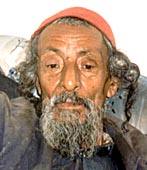
The History of the Yemeni Jews [Archives:1999/44/Reportage]
November 1 1999
4th in a series
By: Mohammed Hatem Al-Qadhi
& Mohammed bin Sallam
Yemen Times


He said he went to visit his uncle Ibrahim and stayed there for one month. He also met different Jewish Groups in Israel. The Israeli government, as he stated, had offered him a house and a pension; But, he refused all that for he found that the Jewish religion in Israel was not as he expected. He said that some Israelis are secularists; they do not believe in religion, prayers, Saturday, or in the religious rituals. He also added that the Yemeni Jews are practicing their religious rituals in accordance with their religion. He was very much apprehensive about his sons and daughter being victims of the current wave of immortality. He advised the rest of the Yemeni Jews not to migrate to Israel.


The Islamic religion has been very just as well as fair in dealing with this sect. They have been given this name “the non-Muslims enjoying Muslim Protection” only to remind Muslims and their leaders that these people are under their protection. All the Islamic instructions as well as principles, reveal that they should not at all be suppressed, or harmed.
The leaders of the Yemeni Jews have been given the complete freedom to handle the Jews affairs throughout their long presence in Yemen. At the same time, these leaders are to hold accountable to the Muslim leaders.
Why do they immigrate?
Generally speaking, the migration of the Jews either from Yemen or from other countries, as some writers have pointed out, started in (1681-1776) during the reign of Al-Mahdi, Ahmad bin Al-Hassan bin Kasem. Some of the reasons that made some of the rulers take measures to help immigration of some of them were to suppress the rebellion by some of the sects of the Jews. They stated that these rulers were not doing that act willingly; On the contrary, they were forced to do that as these Jews started taking some steps that offended Muslims as well as the Islamic religion. It was also triggered by some political events from inside or outside these countries.
For example, some writers say that the case of expulsion of the Yemeni Jews from Sana’a in the 17th century was due to a revolution of the Jews. It is said that they had started threatening Muslims that they would destroy mosques and then humiliate them. They, furthermore, had the courage to defy the ruler Al-Zaidi. They also made attempts to plunder the public treasury. They even dared to curse the Prophet and Islamic religion in their temples.
Yemen has witnessed times in the past when some of these Jews had claimed to be the Messiah. These sources indicate that in 1172 a Yemeni Jew claimed that he was the Messiah and that he had taken it upon himself to work for the confluence of the Jewish religion with Islam. Despite the fact that sources did not mention his name, it may be said that he was the same Al-Fayomi bin Sadiah, the author of “Bostaan Al-Okool” which talked about the way to unify religions.
This self-proclaimed Jesus has served the Yemeni Jews who wanted to bring the Jews together and then suppress the Muslims. His preachings had strengthened the Jews’ hopes to take control. He also propagated his versions among the Yemenis on the advent of the Ayoobees invasion of Yemen. He, furthermore, tried to be in closer ties with the Ayoobees and gained their support. However, what this self-styled prophet prophesied was in total contradiction with the beliefs of the Jews about Christ. So he was not given great publicity.
Many Jews came to look down upon him as a heretic. The rabbi of the Egyptian Jews wrote a book titled “Epistle to the Yemen” in which he advised the Yemeni Jews to hold steadfast to their religion and not to be swayed away by him.
He ,furthermore, outlined the circumstances in which the real Christ would appear. Finally, this self-proclaimed Christ was killed and the Jews’ rebellion was nipped in the bud.
——
[archive-e:44-v:1999-y:1999-d:1999-11-01-p:./1999/iss44/report.htm]


